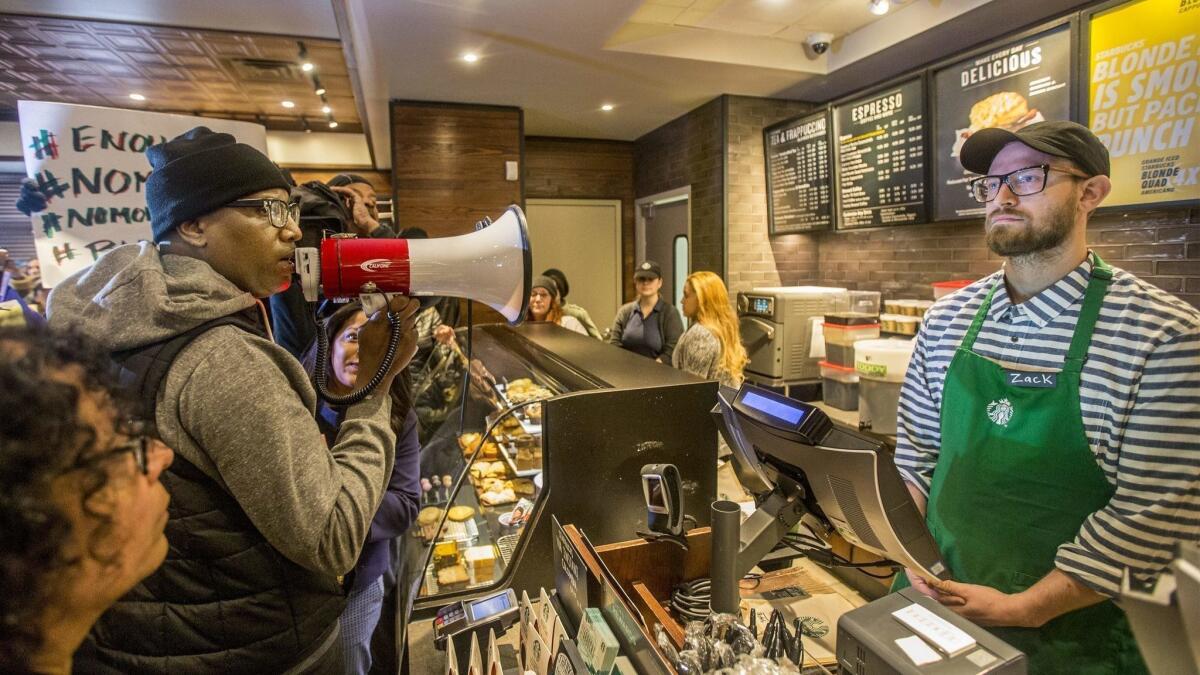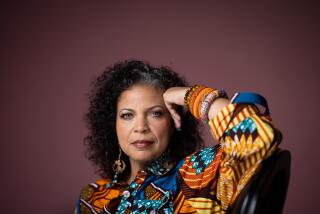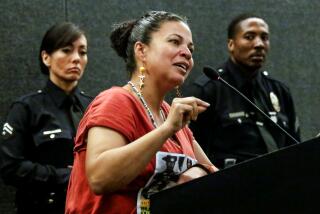They went viral in videos of #LivingWhileBlack. Now, they’re running for office and becoming activists

Kenzie Smith spends his days walking the streets of Oakland, pitching voters on his plan to reduce homelessness, keep rents down, improve schools and help more people find jobs.
But the City Council candidate most frequently gets questions about something else: the time two months ago when a white woman called the cops on him, a black man, for having a barbecue in a city park.
The scene, captured in a video viewed by millions, triggered protests and ongoing conversations in the city on race, access to public space and when it’s appropriate to call police. It spawned a hashtag that black families around the country still use as they post photos of themselves outdoors: #BarbecuingWhileBlack.
It seems a new video emerges every week in the burgeoning genre of white people siccing police on nonwhite people for taking part in everyday activities: using coupons at a CVS in Chicago, napping in a Yale dorm common room, or playing golf too slowly in Pennsylvania, to name a few broadly publicized ones.
Now, some of the small but growing numbers of people featured in those videos are using the attention to run for office, become activists, form nonprofits or otherwise enter the fray of race, politics and social change.
In Philadelphia, two black men who were arrested in April after being denied bathroom access while waiting to meet somebody at a Starbucks are working with the city on a $200,000 fund to help underprivileged youth become entrepreneurs.
In New York, a black man who had police called on him in April as he moved into an apartment is lobbying Congress to hold hearings on racial profiling. Others at the center of similar experiences have joined him.
In Oregon, a black state representative was stopped by police this month as she went campaigning door-to-door in her own district. She posted a photo of herself smiling with the officer and is using the experience to raise campaign funds and recruit volunteers.
For Smith, having the cops descend on him while barbecuing was a big part of what spurred him run for City Council.
“If you feel something hateful is done to you, you respond with love and positivity,” said Smith, 37, who has made combating racial profiling a part of his platform. “That’s what I’m doing.”
The pattern of transitioning personal experience to political action follows in the footsteps of other movements around race, according to Rashad Robinson, who leads Color of Change, a national racial justice group based in New York.
“After Trayvon Martin was killed, there was the Trayvon Martin Foundation. And after other black kids were killed, their mothers formed Mothers of the Movement” to raise awareness about police shootings of black youth, Robinson said. “These sorts of moments are not just deeply painful and troubling for the person experiencing them but drive people to want to be engaged to make a change.”
In Oakland, Smith’s experience came after years of going to the same area of Lake Merritt Park to barbecue. He was grilling tri-tip with his wife and friends when a woman approached to complain that they were using a charcoal barbecue in an unauthorized area.
Smith’s wife, who is white, filmed the encounter as she accused the woman of targeting the group because many of its members were black. The woman denied that was her motivation. Police showed up but issued no tickets or arrests. The hours-long ordeal reignited a debate in the city over rapid gentrification that has led to greater policing and regulations in historically black areas that are now whiter and wealthier.
Not long after the incident, a city councilwoman nominated Smith to join the local parks commission. He then launched his campaign.
“I could just sit there and do nothing, or get angry,” Smith said. “Or I can try to help.”
It’s a similar sentiment to that of Darren Martin, whose tweeted video of his encounter with police while he was moving boxes into his Upper West Side apartment in New York in the spring became national news. Martin, who is black, said he was racially profiled by a neighbor who told police there was a burglary.
Last month, Martin co-signed a letter to members of the House and Senate judiciary committees urging them to hold hearings on racial profiling. Donisha Prendergast, a documentary maker, also signed the letter after a white woman summoned seven police cars on her and two black friends as the group checked out of a Southern California Airbnb in May. (Prendergast, who is Bob Marley’s granddaughter, was visiting to help run a reggae music festival.)
Also signing was Lolade Siyonbola, the Yale graduate student who faced officers in May after a white student called them upon seeing Siyonbola sleeping in dorm common room.
The letter, which got nearly 1,500 signatures on Change.org, asked Congress to pass legislation to address racial profiling.
“I wanted to see the needle move on this,” said Martin, who was a White House aide during the Obama administration. “If we are having an American conversation about this issue, why not call out the people who are supposed to convene and solve this problem?” The letter has gotten no reply.
Not everyone is so directly entering the political fray. After the Philadelphia Starbucks incident — which led the company to briefly close thousands of U.S. stores for bias sensitivity training sessions — two witnesses launched a nonprofit to promote awareness of racism.
In a video of the Starbucks arrest, Michelle Saahene yells in the background that the two black men arrested “didn’t do anything.” Melissa DePino, another customer, uploaded the video that has been retweeted by 168,000 people and viewed millions of times.
Strangers at the time, Saahene and DePino later connected through a mutual friend to launch From Privilege to Progress, a social media project that spreads stories of racial discrimination. It focuses on bringing together racially segregated social networks. The group has compiled data showing that people’s connections on Facebook, Instagram and Twitter tend to be mostly of the same race.
“I really just did a simple thing,” said DePino, 50. “I witnessed something wrong and spoke up about it and shared it in my social network, which happens to be mostly white. That brought attention to this issue that really happens all the time.”
DePino, who is white, said many of the responses she got from white friends were of shock. But Saahene, who is black, said people in her networks were not surprised to see the incident.
From Privilege to Progress runs accounts on Facebook, Instagram and Twitter and posts items about race and justice issues, such as one on the July 17 anniversary of the death of Eric Garner, the man who inspired a protest chant after he shouted “I can’t breathe” when a police officer used a chokehold on him four years ago in Staten Island, N.Y.
The group also posts items intended to educate, and the reaction to one this month is illustrative. It concerned “voice bias,” when people who speak certain dialects of English or talk with accents experience discrimination. A video showed U.S.-raised Asian and African Americans talk about taking offense when told they “sound white” — with the implication that it’s a surprise people of their race can speak English well. They also talk on the video about the backhanded compliment of being told they are “well-spoken.”
Susan Freddie, a white follower of the account, chimed in with a reply.
“I have often used the phrase ‘well spoken’ but I’ve done so in admiration (usually in terms on public speaking) because its something I struggle with (being articulate, especially in front of a group or audience),” she wrote. “I never thought of it in this context nor would I think to examine it from this perspective. Thank you for the lesson. I know there are many to come.”
Twitter: @jaweedkaleem
More to Read
Sign up for Essential California
The most important California stories and recommendations in your inbox every morning.
You may occasionally receive promotional content from the Los Angeles Times.











